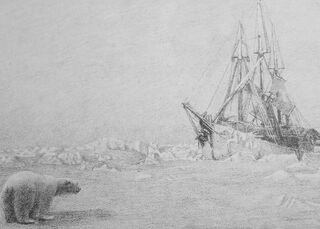Fear
Accident and Exploration
Part III of IV: How chance plays a vital role in human discoveries
Posted February 27, 2021 Reviewed by Kaja Perina

The history of scientific discovery affords a gripping view of the back and forth between what we expect to fish out of the unknown, and what is revealed by accident. Contrast, for example, the laborious, directed research that every year results in vaccines tweaked for the latest influenza strain (including Pfizer's and Moderna's Covid-19 jabs), along with the billions unsuccessfully spent trying to create a vaccine for AIDS—versus the many crucial discoveries that have occurred by chance; through a more open, haphazard version of human curiosity.
Cases in point: Alexander Fleming's realization that a set of dirty petri dishes, which his lab assistants neglected to put away or clean over a couple of weeks' vacation, had grown a bacteria-killing mold that eventually was called penicillin; the microwave oven, stumbled upon when an engineer working on radar found that the candy bar in his pocket melted when he got too close to a transmitter; UK92480, a drug Pfizer chemists were hoping could treat heart disease, which didn't work in that department but had spectacular results in another, after which it was marketed as Viagra; and LSD-25, which caused hallucinations in Swiss chemist Albert Hoffman when, in 1943, he accidentally touched, with an ungloved finger, the ergot compound he was altering for use as a vasoconstrictor in obstetrics.
What is the ratio of open scan and curiosity, and the accidental observations in which they result, to feedback and more directed exploration? The process of ideation typically involves three main steps: distancing oneself from preconceived notions while exploring, and coming up with an idea that explains or uses new data; then, testing and implementing the idea. Another way of looking at this is the contrast of an open, random "scanning" stage focused on the unknown to a more predictable, reductive testing process of data we're familiar with—which, in turn, comes down to acceptance of chance versus a confidence in agency and control. fMRI scans and memory tests reveal that the hippocampus, a seahorse-shaped organ in the brain's limbic system, plays a fundamental role in both processes--what's known as directed, and passive, "information foraging." While researchers have yet to quantify which of those functions is neurologically preponderant in humans, it seems possible that gauging the ratio of open exploration of the unknown to predictable observation of what we're familiar with—a form of the afferent/efferent dichotomy—would offer, by implication, lessons in how better to manage, and accept, the role of chance and the impact of mystery in our daily lives.
What is certain, from the record, is that mammals are programmed to be curious about their surroundings, and to take risks to satisfy that curiosity. Laboratory rats will investigate a maze even when their physical needs have been met. Daniel Berlyne attributed human curiosity to a state of "arousal" caused by an environment high in uncertainty and low in information. Freud, of course, tagged such arousal, and the resulting exploration, as primarily sexual. Harry Fowler posited that curiosity-based exploration was a product of both homeostatic (internal) processes, such as dealing with boredom, and external stimuli. A taste for exploring the unknown, and making oneself subject to the random events certain to be found there, has always been part of the psychological makeup of a subsection of human society.
It's impossible to take the temperature of how humans in ages past understood the role of accident, or the balance between the kind of excited optimism that prompted people to venture into the unknown, versus the pessimistic fear that kept others home. We can only surmise from the evidence that the odds of survival when venturing forth were much slimmer than today, and assume that respect for random disaster was greater in the Bronze or Copper Ages. We can analyze seeds in the mummified gut of Ötzi, a corpse known as "The Iceman," to determine that 5,000 years ago this hunter must have been foraging for mountain herbs in the Italian Alps when he discovered a valley where he happily munched on lowland greens: but shortly thereafter stumbled across members of a lowland tribe who read him as hostile and attacked Ötzi, whereupon he fled to die, wounded and alone, in the surrounding glaciers. It seems likely that a man foraging for herbs in unknown mountains must keep a sharper eye out for random threats than an IT exec taking light-rail to work in 21st Century Seattle. And yet, despite the unknown dangers that lay over the next ridge, Ötzi left his home turf and went climbing into unknown territory.
All exploration, and the curiosity drive that underlies it, is the domain of accident: accident in the sense of the unknown that the explorer confronts, which to her or his mind contains many attributes of random chance; accident, too, in the sense of "unforeseen event," because unexplored territories by definition generate problems and dangers no one could predict. It's no coincidence that on old maps the "unknown" portions are filled with mythical monsters, for they symbolized both the lack of information about the territories into which explorers might venture, the fear such ignorance conjured, and the role of the imagination in filling the unknown with something it understood. The history of exploration is replete with examples of gruesome and unexpected "accidents" that beset so many expeditions, from the wild leaps into the oceanic void that characterized (and largely destroyed) the expeditions of Magellan and Corte-Real, to the unexpected harshness of Arctic ice (and, possibly, lead-poisoned food) that caused Sir John Franklin's 1845 Northwest Passage expedition to vanish off the face of the Earth.
The nature of exploration has changed as humans have traveled to, mapped, and studied every corner of the planet with the exception of deepest ocean, surrounding space, and the human brain. We are far from Ötzi's quest for new nuts and roots that took him over the mountain. The Northwest Passage has been fully mapped and indeed, thanks to global warming, is becoming the ice-free short cut between Atlantic and Pacific of which Franklin and Corte-Real dreamed. We no longer have to ride wagons through mapless plains, let alone forage for greens, to survive in modern America. The servo-systems that cosset our lives are pervasive, and so we proceed as if our lives were mostly predictable; as if the given and safe were the norm and "accident" merely what the word has come to mean, per the Oxford English Dictionary, since it made its way from the French: "... Anything that happens without foresight or expectation; an unusual event, which proceeds from some unknown cause ... an unfortunate event, a disaster, a mishap."
Next, Part IV: Sex and Accident


